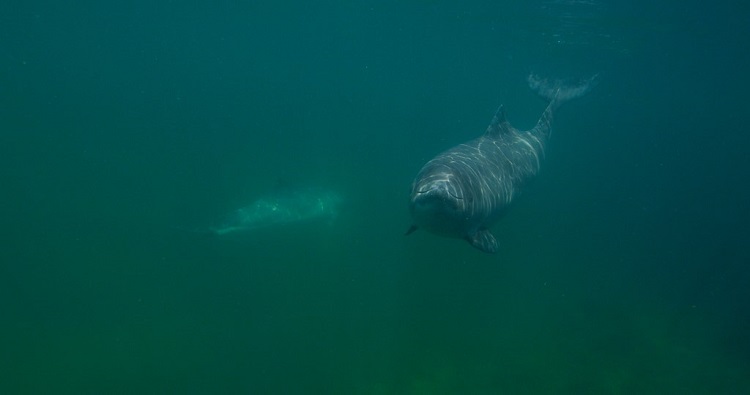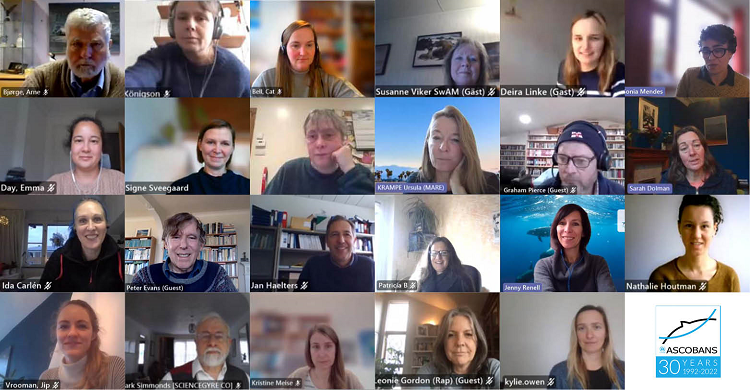10th Meeting of the North Sea Group

© Florian Graner
Bonn, 21 January 2022 – The tenth Meeting of the Steering Group for the ASCOBANS Conservation Plan for Harbour Porpoises in the North Sea (the North Sea Group) took place online from 18th to 19th January 2022. Chaired by Prof Peter Evans (Bangor University & Sea Watch Foundation UK), the aim of the meeting was to exchange countries' updates on the implementation of actions listed in the Conservation Plan.
The meeting discussed key priorities such as the implementation of existing bycatch regulations and investigation of the effects of anthropogenic sounds on harbour porpoises. The monitoring of distribution and abundance of and the investigation of the health, contaminant burdens and diet of harbour porpoises were also reviewed.
During the discussions on bycatch, it was noted that submission of data to ICES Working Group on Bycatch of Protected Species (WGBYC) was improving in comparison to earlier years, and bycatch events, fishing effort, and monitoring effort had been submitted by most countries. Comparison of fishing effort of various fishing gears was found to yield similar results between VMS and AIS (two methods of tracking fishing vessels) in the North Sea (2015-2018 data). This encouraging finding may lead to improved monitoring efforts for those small vessels (<15m length), which carry AIS transmitters. It also enables more ready access to better measures of fishing effort than simply adding up days at sea.
A concern, however, were revised bycatch estimates provided by the ICES Workshop on Estimation of Mortality of Marine Mammals due to Bycatch (WKMOMA). Estimates ranged upwards of 1,600 animals per year for the Greater North Sea, and largely exceeded the thresholds indicated from RLA analyses. Two issues were raised. Bycatch estimates are mainly calculated from "days at sea" and omit relevant information such as length of net used and soak times (the duration that gillnets are in the water). Second, monitoring effort is very low and is not targeted at high-risk areas and times. Both of these may lead to significant errors in estimates of bycatch rates. Furthermore, the fact that small vessels are generally not monitored could underestimate bycatch. Great uncertainty therefore remains around all bycatch estimates in the region.
The meeting acknowledged the need to revisit the ASCOBANS conservation objectives to incorporate a timeframe, and to take account of the requirement to drive anthropogenic removals to zero. It was agreed that common solutions to fulfil conservation aims should be reached by engaging and taking into regard stakeholder interests.

With regards to alternative pingers and gear modifications, pingers were reported to effectively work in Norwegian and Swedish commercial fisheries, and the technical issues arising from these mitigation measures were likely caused by the setup and adherence to operational guidelines. A study conducted by Sweden found that Future Ocean pingers exceeded the bycatch reduction rates of Banana pingers, although the latter were more practical in their implementation. Mobile remote electronic monitoring (REM) systems were also being trialed in several countries, and methods to improve their cost-effectiveness were discussed. Testing of bycatch mitigation actions at a fleet level, and implementation of those that are effective and practical, was identified as a priority.
Participants expressed their concern with regards to population level impacts of noise levels and exposure duration. The meeting heard updates from JNCC, who presented their guidance on noise limits based on six years of retrospective data. The overall advice was to limit the amount of noise in both time and space within SACs, and avoid lengthy periods of anthropogenic disturbance. It was recommended to use deterrence ranges for harbour porpoises based on empirical evidence on the species' displacement ranges. A 10-20% noise limit approach was suggested, which will be regularly reviewed by JNCC to assess its feasibility. Sub-bottom profilers were also mentioned as a significant disturbance source, and further research on high-frequency equipment with high ping rates was advised. Overall, Parties and non-Party Range States were encouraged to harmonize noise thresholds for regulatory purposes on an international level.
Dr Lonneke IJsseldijk from the Netherlands presented recent findings on the mass stranding event that occurred on the Dutch Wadden Sea Islands in August 2021. Two-hundred harbour porpoises, in similar stages of decomposition, had stranded within 10 days. Necropsies from 22 of them have not brought up evidence of a direct anthropogenic impact. Preliminary results indicate the cause of death to have been septicemia by a bacterial infection (Erysipelothrix rhusiopathiae), although a direct link between the microbiological results and the gross pathological findings still has to be established. The meeting urged Parties to seek to facilitate rapid collaboration with stranding networks in the event of future unusual mortality events.
Other activities conducted by Range States included tagging programmes and telemetry studies of harbour porpoises in the Wadden Sea. The aim of these studies was to gain an insight of movements of individuals within this population since there was some indication that porpoises may be resident within the Wadden Sea., Future studies on genetic structure and habitat use were welcomed. A declining abundance trend between 2017-2020 in the waters of Skagerrak was also highlighted, in contrast to the relatively stable abundance estimates of porpoises in the Danish North Sea. The cause for the decline in the Skagerrak is to be determined although bycatch may play a role.
The meeting concluded with the review and agreement on the Priority Recommendations from the North Sea Group. The Recommendations, as well as the meeting report, will be made available on the meeting page in due course.
Last updated on 02 September 2022


